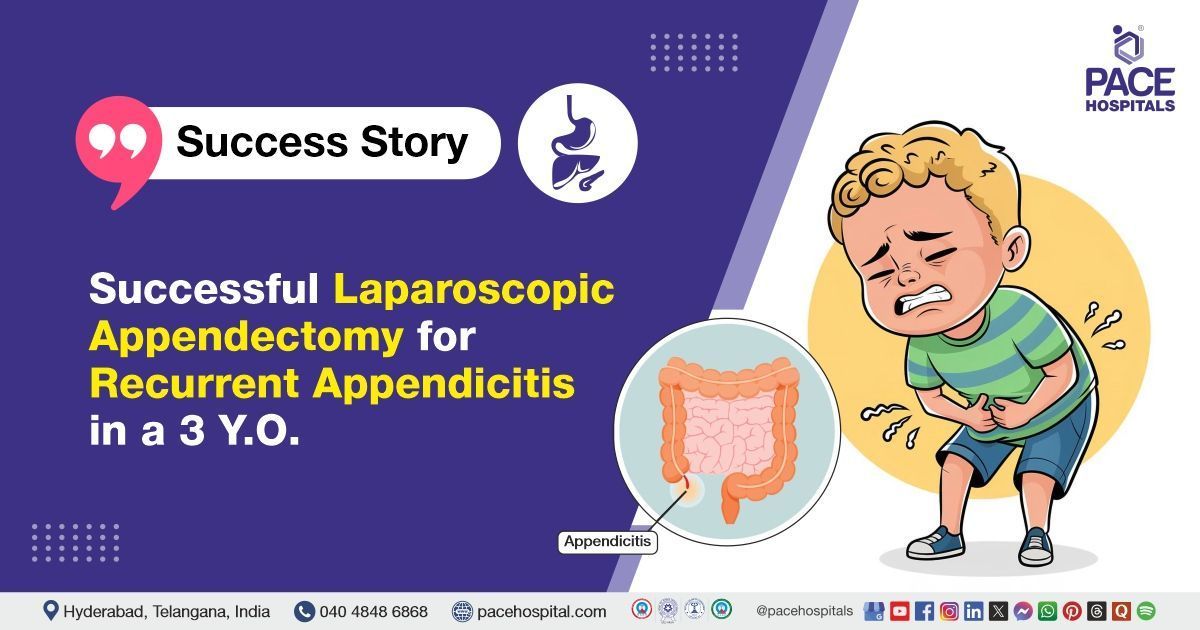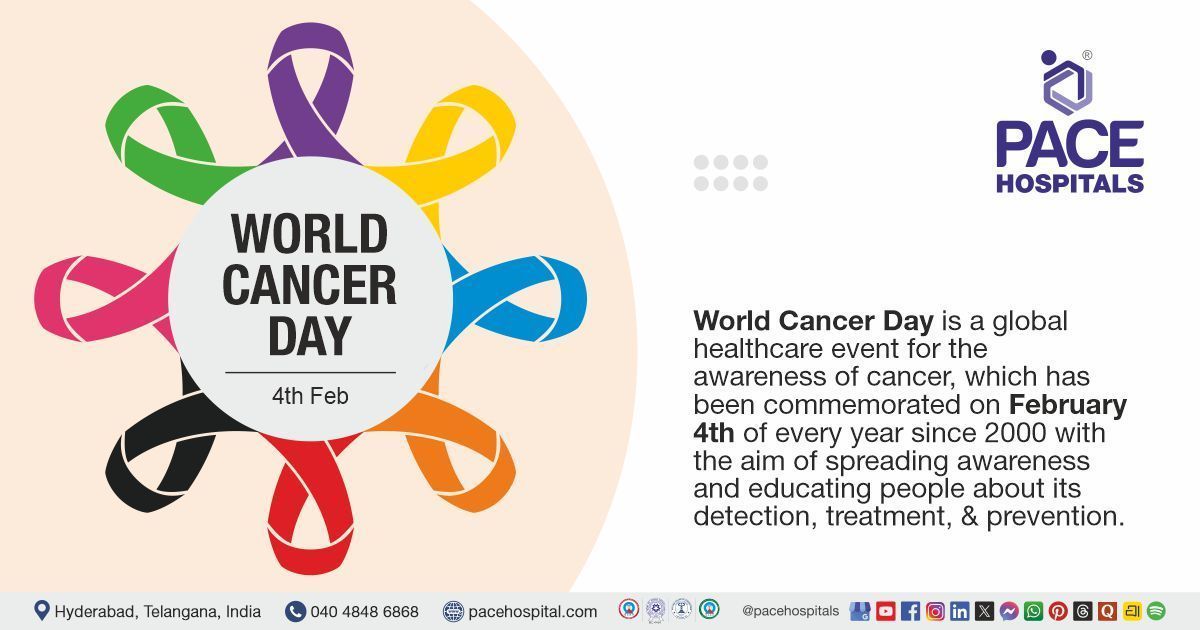Successful Laparoscopic Appendectomy for Recurrent Appendicitis in a 3-year-Old
PACE Hospitals
PACE Hospitals’ expert Surgical Gastroenterology team successfully performed a laparoscopic appendectomy on a 3-year-old male child who had presented with acute appendicitis. The procedure was carried out to relieve the symptoms associated with the condition and to promote smoother functional recovery, ultimately enhancing the child’s overall quality of life.
Chief Complaints
A 3-year-old male child had presented to the Surgical Gastroenterology Department at
PACE Hospitals, Hitech City, Hyderabad, with complaints of occasional abdominal pain and excessive crying over the past two months, along with occasional fever. His symptoms had gradually worsened, prompting further evaluation for possible underlying causes.
Past Medical History
The patient had a documented history of acute
appendicitis in the past, which was managed conservatively without surgical intervention. At that time, symptoms were controlled with medical management, and the condition appeared to be resolved. However, the recurrence of symptoms indicated the need for further evaluation and definitive treatment.
Diagnosis
After admission to PACE Hospitals and initial assessment, a comprehensive diagnostic workup was conducted, including complete blood count (CBC), liver function tests, coagulation profile, serum electrolytes, and renal function tests to evaluate the patient’s overall condition.
An abdominal ultrasound was performed to evaluate the patient’s abdominal symptoms. It revealed an enlarged, non-compressible appendix measuring 8 mm, along with a few reactive lymph nodes in the right iliac fossa, consistent with acute appendicitis. These findings supported the clinical diagnosis and confirmed a recurrence requiring surgical intervention.
Based on the confirmed diagnosis, the baby was advised to undergo
Acute appendicitis Treatment in Hyderabad, India, under the specialized care of the surgical gastroenterology department.
Medical Decision Making
After consulting with Dr. Suresh Kumar, a surgical gastroenterologist, a comprehensive evaluation was carried out to determine the most appropriate diagnostic and therapeutic approach for the patient. Based on their expert assessment, it was concluded that a laparoscopic appendectomy would be the most effective procedure to address the patient’s condition.
The patient's family members were thoroughly counselled regarding the nature of the condition, the need for surgical intervention, and the potential risks and benefits associated with a laparoscopic appendectomy.
Surgical Procedure
Following the decision, the patient was scheduled to undergo laparoscopic appendectomy surgery in Hyderabad at PACE Hospitals, under the expert supervision of the surgical gastroenterology Department.
Before the surgery, informed consent was obtained after the procedure was thoroughly explained and the patient’s family demonstrated a clear understanding of the surgical process and associated risks.
- Patient Positioning & Anesthesia: The child was placed under general anaesthesia in a supine position.
- Creation of Pneumoperitoneum: A small incision was made near the umbilicus to insert a Veress needle or trocar, and carbon dioxide gas was insufflated to create space within the abdomen.
- Trocar Placement: Additional ports were inserted under direct vision to allow access to surgical instruments and a laparoscope.
- Exploration & Identification: The abdominal cavity was examined, and the inflamed appendix was located in a retrocecal position.
- Dissection & Ligation: The mesoappendix was dissected and ligated to control the blood supply.
- Appendix Removal: The base of the appendix was secured using end loops or a stapler, and the appendix was removed.
- Irrigation & Inspection: The area was irrigated with saline to ensure no residual infection, and the rest of the abdomen was inspected for any abnormalities.
- Port Closure: Trocars were removed, and incisions were closed using absorbable sutures.
Intraoperative Findings:
- The appendix was found to be inflamed, confirming the diagnosis of acute appendicitis.
- It was identified in a retrocecal position, meaning it was located behind the cecum, which can sometimes make access and visualization more challenging.
- The mesoappendix, which contains the appendiceal artery and lymphatic tissue, was carefully ligated using electrocautery and surgical clips to control blood flow and prevent bleeding.
- The base of the appendix and the cecum appeared healthy, with no signs of perforation, abscess, or surrounding infection.
Postoperative Care
The surgical procedure was completed without any intraoperative complications. In the postoperative period, the child developed intermittent fever spikes and symptoms suggestive of acute gastroenteritis. A pediatrician consultation was taken promptly, and appropriate supportive and symptomatic management was initiated.
The child showed symptomatic improvement and was hemodynamically stable and prepared for discharge with detailed post-discharge care instructions and follow-up recommendations.
Discharge Medication
Upon discharge, the patient was prescribed a course of antibiotics to treat any residual or underlying infection. Proton pump inhibitors (PPIs) were included to reduce gastric acid secretion and protect the gastrointestinal mucosa. Antipyretics were prescribed to manage fever, while multivitamins were given to support overall nutritional recovery and immune function. Mucolytics were recommended to help in thinning and clearing respiratory secretions. Probiotics were included to restore and maintain healthy gut flora, especially following antibiotic use. Supportive treatment was also advised.
Discharge Advice
The patient was advised to continue a normal diet to support nutritional recovery and maintain energy levels. An Oral Rehydration Solution (ORS) of 500 ml daily was prescribed to ensure adequate hydration and electrolyte balance, especially in view of recent gastroenteritis.
Emergency Care
The patient was informed to contact the emergency ward at PACE Hospitals in case of any emergency or development of symptoms such as fever, abdomen pain and vomiting.
Review and Follow-Up
The patient was advised to return for a follow-up visit with the Surgical Gastroenterologist in Hyderabad at PACE Hospitals, after 1week with the Histopathological examination (HPE) report.
Conclusion
This case highlights the successful management of acute appendicitis through a laparoscopic appendectomy, which resulted in significant relief of symptoms, a smooth postoperative course, and a faster recovery with minimal risk of complications.
Laparoscopic Appendectomy Offers Superior Outcomes in Pediatric Recurrent Appendicitis
For young pediatric patients with recurrent appendicitis, laparoscopic appendectomy is a reliable and minimally invasive surgical option. Its minimally invasive technique lessens surgical trauma, which results in less pain and scarring after surgery. These outcomes are especially crucial for children's psychological and physical recovery. This technique additionally contributes to a quicker return to regular activities, a decreased risk of wound infections, and shorter hospital stays. Laparoscopic appendectomy performed by a surgical gastroenterologist / surgical gastroenterology doctor is particularly beneficial for pediatric patients with complex or recurrent appendiceal disease because of these advantages, which together lead to quicker and smoother functional recovery.
Share on
Request an appointment
Fill in the appointment form or call us instantly to book a confirmed appointment with our super specialist at 04048486868
Appointment request - health articles
Recent Articles











